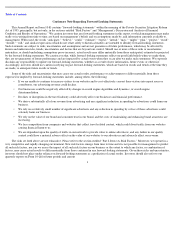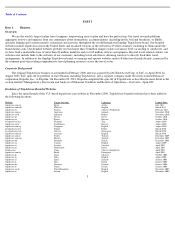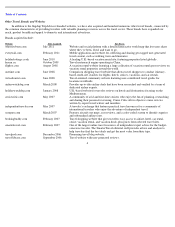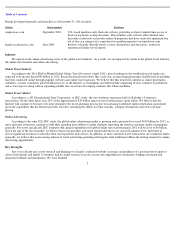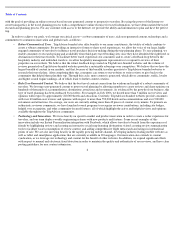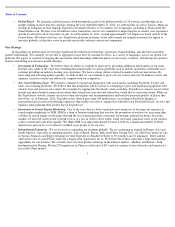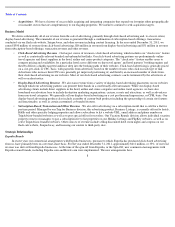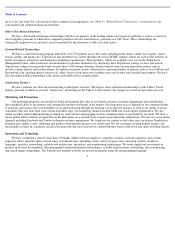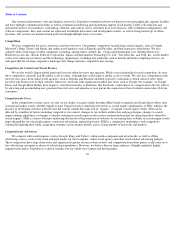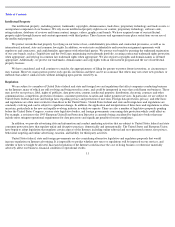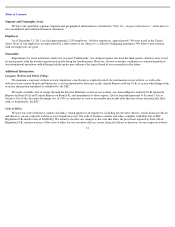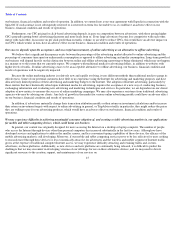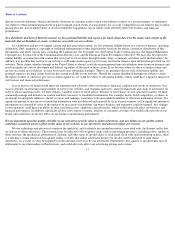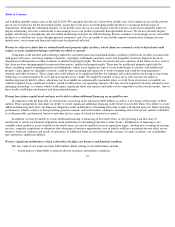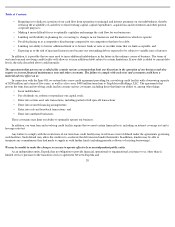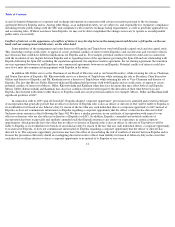TripAdvisor 2011 Annual Report Download - page 15
Download and view the complete annual report
Please find page 15 of the 2011 TripAdvisor annual report below. You can navigate through the pages in the report by either clicking on the pages listed below, or by using the keyword search tool below to find specific information within the annual report.
Table of Contents
Intellectual Property
Our intellectual property, including patents, trademarks, copyrights, domain names, trade dress, proprietary technology and trade secrets, is
an important component of our business. We rely on our intellectual property rights in our content, proprietary technology, software code,
ratings indexes, databases of reviews and forum content, images, videos, graphics and brands. We have acquired some of our intellectual
property rights through licenses and content agreements with third parties. These licenses and agreements may place restrictions on our use of
the intellectual property.
We protect our intellectual property by relying on our terms of use, confidentiality procedures and contractual provisions, as well as on
international, national, state and common law rights. In addition, we enter into confidentiality and invention assignment agreements with
employees and contractors, and confidentiality agreements with other third parties. We protect our brands by pursuing the trademark registration
of our core brands, such as TripAdvisor and the Owl Logo, maintaining our trademark portfolio, securing contractual trademark rights protection
when appropriate, and relying on common law trademark rights when appropriate. We also register copyrights and domain names as deemed
appropriate. Additionally, we protect our trademarks, domain names and copyrights with an enforcement program and the use of intellectual
property licenses.
We have considered, and will continue to consider, the appropriateness of filing for patents to protect future inventions, as circumstances
may warrant. However, many patents protect only specific inventions and there can be no assurance that others may not create new products or
methods that achieve similar results without infringing upon patents owned by us.
Regulation
We are subject to a number of United States federal and state and foreign laws and regulations that affect companies conducting business
on the Internet, many of which are still evolving and being tested in courts, and could be interpreted in ways that could harm our business. These
may involve user privacy, libel, rights of publicity, data protection, content, intellectual property, distribution, electronic contracts and other
communications, competition, protection of minors, consumer protection, taxation and online payment services. In particular, we are subject to
United States federal and state and foreign laws regarding privacy and protection of user data. Foreign data protection, privacy, and other laws
and regulations are often more restrictive than those in the United States. United States federal and state and foreign laws and regulations are
constantly evolving and can be subject to significant change. In addition, the application and interpretation of these laws and regulations is often
uncertain, particularly in the new and rapidly-evolving industry in which we operate. There are also a number of legislative proposals pending
before the United States Congress, various state legislative bodies, and foreign governments concerning data protection which could affect us.
For example, a revision to the 1995 European Union Data Protection Directive is currently being considered by legislative bodies that may
include more stringent operational requirements for data processors and significant penalties for non-compliance.
In addition, we provide advertising data and information and conduct marketing activities that are subject to United States federal and state
consumer protection laws that regulate unfair and deceptive practices, domestically and internationally. The United States and European Union
have begun to adopt legislation that regulates certain aspects of the Internet, including online editorial and user-generated content, user privacy,
behavioral targeting and online advertising, taxation, and liability for third-party activities.
United States federal, state and foreign governments are also considering alternative legislative and regulatory proposals that would
increase regulation on Internet advertising. It is impossible to predict whether new taxes or regulations will be imposed on our services, and
whether or how we might be affected. Increased regulation of the Internet could increase the cost of doing business or otherwise materially
adversely affect our business, financial condition or operational results.
11


